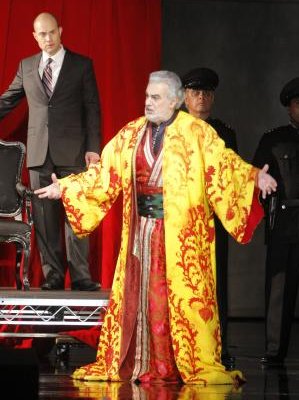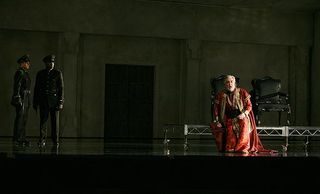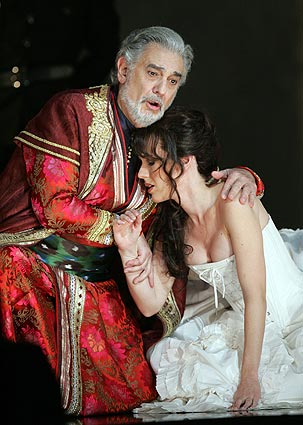 I have held back from compiling a post of the reports from this, four performances into a run of five. I am a little disappointed that California, supposedly the tech capital of the world, seems almost bereft of independent voices.
I have held back from compiling a post of the reports from this, four performances into a run of five. I am a little disappointed that California, supposedly the tech capital of the world, seems almost bereft of independent voices.
I also find the reviews somewhat problematic in their naivety. A lot of complaints about the production, but it is difficult to judge whether these are really justified, or whether they are a product of conservative audiences wanting ultra-traditionalist spectacles (or the reviewers projecting this assumption onto their readers).
 I also find it wearisome to toil through endless "Shucks how weird" references to the counter-tenor voice or to the presence in the pit of instruments such as theorbos that don't have a place in a modern symphony orchestra, or the insinuation that the only Handel operas that exist are those that happen to have been performed in recent years at the New York Metropolitan opera house.
I also find it wearisome to toil through endless "Shucks how weird" references to the counter-tenor voice or to the presence in the pit of instruments such as theorbos that don't have a place in a modern symphony orchestra, or the insinuation that the only Handel operas that exist are those that happen to have been performed in recent years at the New York Metropolitan opera house.
Also, most of the reviews, even those written exclusively for the internet, insist on long-winded recaps o the plot, which was never meant to be straightforward. It's a lot of padding to scroll through, and adds nothing to the writing, because those people who aren't familiar with the plot can look it up in Wikipedia
And last of all, I am disappointed (not the reviewers' fault!) at the frequent mention of people leaving before the final act. I accept that there are always valid reasons to leave early - in town from out of town for other business, might as well catch something if not everything before the last train; not feeling at all well; and really not liking it one bit to the point of irritation. But in an opera where most of the real gems of highlights come in the final act, it seems perverse to miss that!
I do realise I am reading from a position of luxury, having bought tickets for and failed to attend more Handel operas this year alone than have probably been performed in the entire United States ever.
In summary, I don't see any reviews that are providing me with a Handelian insight I desire.
That having been said, here goes with a summary of the reviews and reports!
Opera review: 'Tamerlano' at L.A. Opera
 Domingo's voice may be too robust, lush and big to be ideal for works
by baroque composers such as Handel. But the famed tenor was able to
invest the part with great sympathy and appeal.
Domingo's voice may be too robust, lush and big to be ideal for works
by baroque composers such as Handel. But the famed tenor was able to
invest the part with great sympathy and appeal.
Domingo proved less agile and ornate in embellishment than did his
colleagues, and his voice began to lose some sheen over the course of
the 3 1/2-hour evening.
But no one came close to the dramatic
power he invested in his role, and, despite Handel’s minor-key
reconciliation chorus, his death scene almost justified the director’s
hopeless vision.
Domingo, dressed in colorful Turkish robes (did he insist?) as the
imprisoned Bajazet, said to be the first major tenor role in opera, was
not entirely in his element. The Baroque style is not really his forte,
and he dispatched the quick running figures, the ornamental filigree
and trills of the part with something less than aplomb. Still, he found
plenty of lyrical passages with which to float and exude impressively
and he was a dramatic force in the recitatives. Good dying scene, too.
Tamerlano, Music Center, Los AngelesDomingo’s doomed sultan Bajazet delivers a death scene (given here in
full) drenched in pathos and magnanimity of spirit, his voice a bit
slow to warm at the start, his timbre sounding a mite baritonal, his
communicative powers still unmatched. Some things in opera may be
eternal.
Opera Heaven
Is tenor Placido Domingo really 68 years old? In the role of the
captive sultan Bajazet, Domingo sang like a champ. True, he no longer has the vocal
control of his youth but there's still plenty of bloom and lyrical power left. His
tender act three duet with the gorgeous soprano Sarah Coburn, playing the
part of Bajazet's daughter Asteria, was one of the evening's several
highlights.
Domingo’s Towering “Tamerlano” Bajazet: Los Angeles Opera – November 22, 2009
with pictures
tickets were virtually impossible to find and surely will be a
cherished memory for anyone who has seen this great 21st century
performance by Domingo in a role in which he makes profound
impressions, both vocally and histrionically.
Tamerlano
The great Placido Domingo plays
Bajazet in this limited-run production, which closes December 1. He was
in fine voice during the opening night performance, although he seemed
to grow tired and jumped his musical cue at the opening of Act 3.
Still, he splendidly portrayed the proud but defeated sultan
Domingo brilla en ‘Tamerlano’
Domingo encarna el espíritu del sultán derrotado hasta su dramático
final en el tercer acto, aunque su voz no escondía el cansancio,
pasadas las tres horas de función, la noche del sábado.
Opera review “Tamerlano”
Plácido Domingo as Bajazet is of course the main reason for attending
this opera. His voice has depth, power, range, and as mentioned he has
a great death scene: He’s the true tragic hero of the evening!
A Tamerlano for the Tenorissimo
In his 126th operatic role, Plácido Domingo seems destined to be, if
not the world’s most adored tenor, certainly its most accomplished. He
has sung in only one other Baroque opera in a long career, but Bajazet
is a role uniquely appropriate for him. Domingo’s recent outing as a
dramatic baritone in the title role of Simon Boccanegra
should by all rights have left his 68-year-old vocal chords hardened
and unready for Baroque coloratura. Understandably lacking some of the
vocal dexterity of his colleagues, Domingo was, however, able to summon
a plangent, brightened version of his tenor voice with enough agility
to negotiate the demands of a role that emphasizes dramatic elements
over pyrotechnics. Even as his energies dipped toward the end of the
victory lap that the role of Bajazet represents for him, Domingo was up
to the challenge, investing his performance with a young man’s
intensity and commitment.
Star Vehicle
He not going down in any history book as a remarkable singer of Handel,
but it is true that his performances continue to be of remarkable
quality. His ability to command the stage with his singing and acting
are largely unparalleled and its still something to watch younger
singers, still in their vocal prime struggle to hold a candle to his
presence.
Placido Domingo plays the Baroque hero almost as if he were on a
nineteenth stage, often dominating the action with his full and rich
tenor voice. Since he is dramatically the most forceful figure,
however, perhaps this is not as ineffective as it may first have
seemed. In a sense, dressed, unlike most of the other modern-suited
figures, in a glorious Turkish robe, he is the perfect foil for
countertenor Bejun Mehta's high-pitched fascist rage.
Domingo and Dudamel
I’ve
met them both briefly in person in the past and what they each exude is
joyfulness, kindness and the sweetness of pure souls.
Domingo takes over the stage in “Tamerlano” .– handsome
as ever, his voice deeper and more golden. His on-going energy for a
work schedule that would bring most of us to our knees is awe inspiring.
Plácido Domingo greets his fans in a post-performance marathon
 Plácido Domingo has seen all kinds of fan adoration in his 40-plus
years in the opera business. But he apparently had not seen anything
quite like the crowd waiting to greet him late Wednesday night in
downtown Los Angeles.
Plácido Domingo has seen all kinds of fan adoration in his 40-plus
years in the opera business. But he apparently had not seen anything
quite like the crowd waiting to greet him late Wednesday night in
downtown Los Angeles.
"Oh my God!" exclaimed the 68-year-old Spanish tenor as he emerged
from a stage door and took a glance at the queue that had formed.
Domingo began autographing at 11:40 p.m. and did not finish until about 1:30 a.m.
When the last autograph had been signed, Domingo -- still looking
energetic -- posed for a few photographs with fans. A Diet Coke
provided to him earlier in the evening remained unopen on a table. He
shook hands and said good night to L.A. Opera staff before disappearing
backstage.

Comments